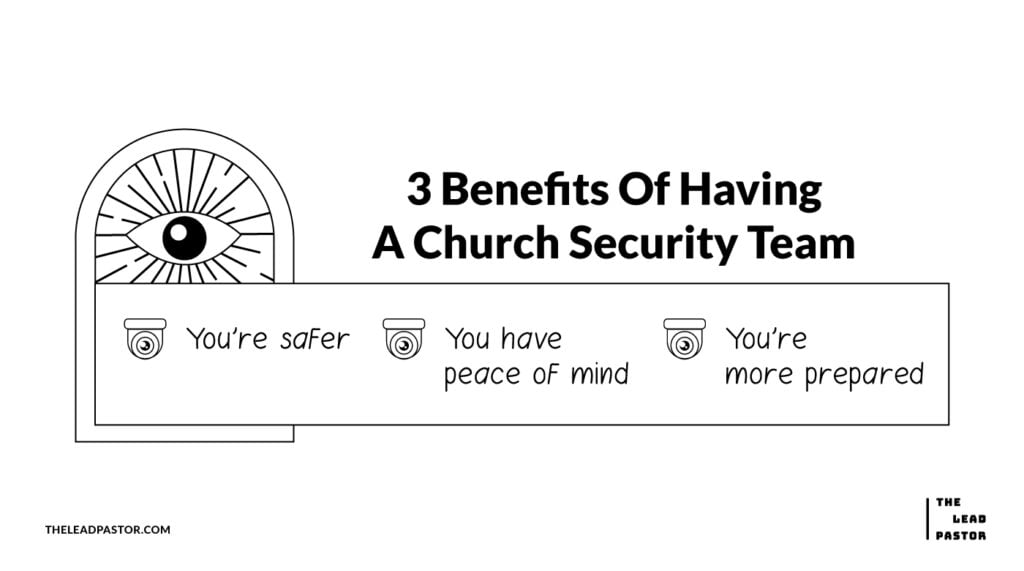Churches are known as places of fellowship, worship, and spiritual formation, not a place where something dangerous could happen. But according to a study conducted by the National Incident-Based Reporting System (NIBRS), 1,652 incidents of violence occurred at places of worship from 2000-2016. Fortunately, there can be something done about it—and it’s by setting up a church security team.
There are few things more important than the safety of those who walk through the doors of your church for Sunday service. After all, caring for the well-being of others is a large part of why you decided to become a pastor.
By launching your own safety team, you get to live out that calling to care for and protect the people of your church in a very practical way. Starting this kind of group gives you the ability to create safer and more contained environments for worship, Sunday school, and volunteer activities, and creates a stronger sense of security for your attendees.
The Lead Pastor is here to help you dive into any and all questions for your church, and that includes church safety and security. I’ll give you an in-depth look into what a church security team is, the responsibilities and benefits, and why you should consider it.
What Is A Church Security Team?
A church security team is a group of unarmed individuals who are trained to keep members of a church safe from harm and perform security measures as needed. This kind of security team is a group that will be there if something goes wrong, and that could be a wealth of situations. It could be anything from medical emergencies to security lockdowns.
It’s a sad reality that something like an act of violence could happen in a church environment, but it’s important to be prepared for all situations.
A positive way to look at a church security team is that you’re taking an active step to steward the gift of God’s creation and keep it safe. Once this safety plan is implemented, you will feel more secure and prepared should an emergency occur.
Are you wondering who to hire for a church security team? You can set up an internal team of church security team members who receive proper training to ensure they’re physically and mentally able to perform their duties.
If you’re looking to hire an internal team, consider asking members who are a part of local law enforcement, like first responders, firefighters, police officers, or military personnel.
Another option is to hire building security professionals for this purpose. This can be a great option if you have a larger church budget for security and just want the additional peace of mind that someone has been trained professionally to protect your church from harm.
What’s The Purpose of The Church Security Team?
The purpose of the church security team is to keep the church safe in the face of danger. In addition, the team is around to help others in the congregation feel safe and protected as they worship.
The reality is if people don’t feel safe at your church, chances are they won't want to come back. So by increasing your security, you can ensure the church is more open and welcoming for everyone to attend without fear or hesitation.
The church security group would serve a significant role, and this should not be taken lightly. But there are also plenty of other responsibilities included in the role that are more preventative in nature.
This could include helping establish stronger child ministry safety protocols, setting up security footage and tools, and creating safety resources for church staff and volunteer training. Let’s take a closer look at some of the roles and responsibilities of this team to see how a church security team could fit into your church setup.
Roles & Responsibilities of The Church Security Team
While the role of a church security team can look different for every church, there are a few key roles that apply across the board. This includes creating policies, establishing emergency action plans and a church security manual, and responding to incidents that need immediate attention.
Create safety plans
Once a church security team has been selected, your team can get to work on drafting safety policies and emergency action plans or EAPs. A few examples of safety policies include child safety policies, lockdown plans, and how to deal with domestic situations or mental health crises.
Before creating your safety plan, consider the following:
- Perform a risk assessment by asking: What are the potential risks to your congregation?
- Who are the point people in an emergency—the pastors, staff members, or someone else?
- Do you have fire extinguishers, first aid kits, and AED machines? If so, where are they located?
Learn more about church security checklists here.
Establish child safety policies
Child safety policies are a very important part of this team since child safety is absolutely critical for kids ministries and the overall health of a church body. Conducting background checks, and setting up security cameras in play areas and parking lots are all ways the team can get to work creating a safer church.
Sunday school safety policies can include:
- Requiring all volunteers to undergo a background check.
- Have parent/guardian contact information for every child.
- Create bathroom policies for children and volunteers.
- Setting up security cameras in and around the area.
- Create security name tags for each child so they can be identified at all times.
- Only allow people with a matching security tag to pick up the child.
Make emergency action plans and handle active threats
EAPs are a bit more complex and might require outside consultation, but they include what to do in situations like active shooters, child custody situations, and thefts. The plan should be agreed upon by all parties involved and utilized by members of the church security team.
It is also important to create scripts for church leadership and team members to use in case something pops up in the middle of a service. That way, the church security plan can be clearly and calmly communicated to audience members.
EAPs can include:
- Clearly defined evacuation protocols and floor plans with escape routes.
- Next steps for reporting an incident to relevant law enforcement officers.
- Gathering emergency contacts for all church members.
- How your church plans to alert a staff member of an emergency.
- Protocol for how and/or when to alert the congregation of an emergency (not all emergencies need to be announced to everyone).
- New staff training that details implementing emergency policies.
Often in emergencies, people tend to go into fight or flight, so be prepared with scripts for church leaders, as this is a great way to ensure safety for all. Your church can do this via text message or in person.
What to include in a script:
- If it is an emergency or warning. Typically, emergencies are more urgent.
- What is happening, but keep it calm and brief.
- Include the next steps, like hiding, evacuating, or finding the nearest exit.
Crisis management can take all sorts of forms outside the typical “emergency” setting. Learn more about crisis management here.
3 Benefits Of Having A Church Security Team

While creating church security is a complex undertaking, it has the potential to be very effective for your church. So let’s take a look at a few of the benefits of a church security team.
You’re safer
The first benefit is pretty obvious—everyone is safer when you have a church security team. Whether it is staff, leadership, or church members, people can be protected from everything from active threats to petty crime.
Unfortunately, according to a survey on stress and mass shootings by the American Psychological Association, one-third of Americans are afraid to go to large gatherings or events due to fear of mass shootings and danger.
When asked which places they are most stressed about the possibility of a mass shooting, adults most commonly say a public event (53%), which could include a small or large church gathering or other gathering at a house of worship.
By having a security team established, you’ll create a safer place for all to worship without anxiety or stress lingering in the back of their minds.
You have peace of mind
Feeling confident—whether it’s when you drop your child off at Sunday school (hopefully with kid's ministry leaders who don't resort to shame-based tactics) or when you are at the church late at night—having a church security team who has a plan in place keeps you safe and also creates a stronger, more tight-knit community.
You’re more prepared
Everyone can be rest assured that, while no one can be 100% safe all the time, they’re in a much better place than if a safety plan wasn’t in place. Oftentimes, church security teams are established in response to a crisis or dangerous situation. Rather than acting defensively, get ahead of it by establishing a church security team and plan before something goes wrong.
Should Your Church Have A Security Team?
Are you considering whether your church should launch a church security team? There are a few things to consider before doing so. Of course, this isn’t always the best option for every church, depending on size or interest, so be sure to do what’s best for you.
Here are some signs that your church is ready for a security team.
- Your church is rapidly growing.
- Your church regularly has outside attendees who aren’t members.
- Your church has a growing children’s ministry and/or no team leader.
- Your church currently doesn’t have any safety measures in place.
- Your church is located in a low-income area of the city.
- Your church has a lot of outside groups using your space.
- Your church has been experiencing minor incidents, and you’re unsure how to respond.
- Members of your church want to create safety measures.
Safety Is In Your Hands
While the ultimate decision to hire a church security team or create your own is your own decision, some safety measures should always be taken. At the very least, you should prayerfully consider creating child safety protocols for Sunday school and setting up some form of security cameras and lock and access control systems. This is all part of good church facility management.
No matter what end of the spectrum you fall on when it comes to security needs, church security will help you and your congregation feel safe, happy, and prepared.
There are plenty of other ways you can make your church a more engaging, enjoyable experience for the people of your community. The Lead Pastor was designed to be a space where you can get all your questions about pastoring answered in one convenient location, whether you’re wanting to learn about church planting or church event management.
If you’re interested in learning more about how to thrive as a church in the modern age, be sure to subscribe to The Lead Pastor newsletter!


